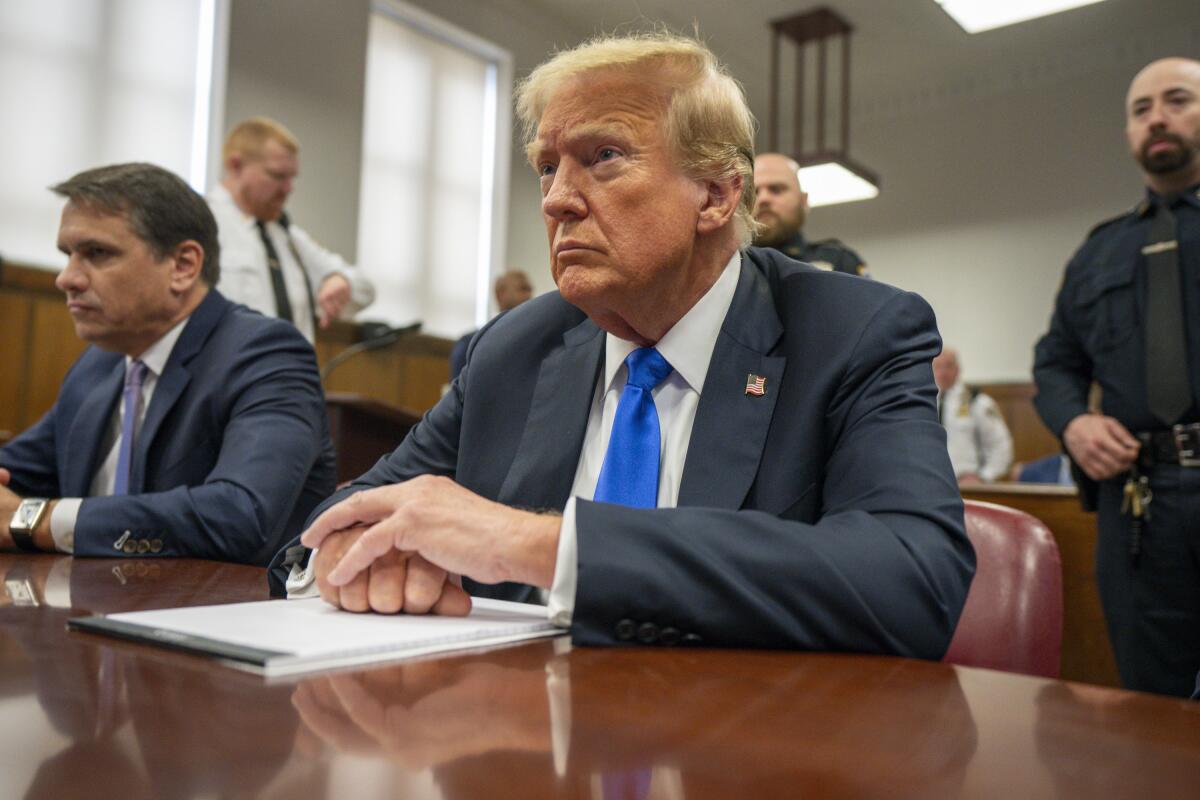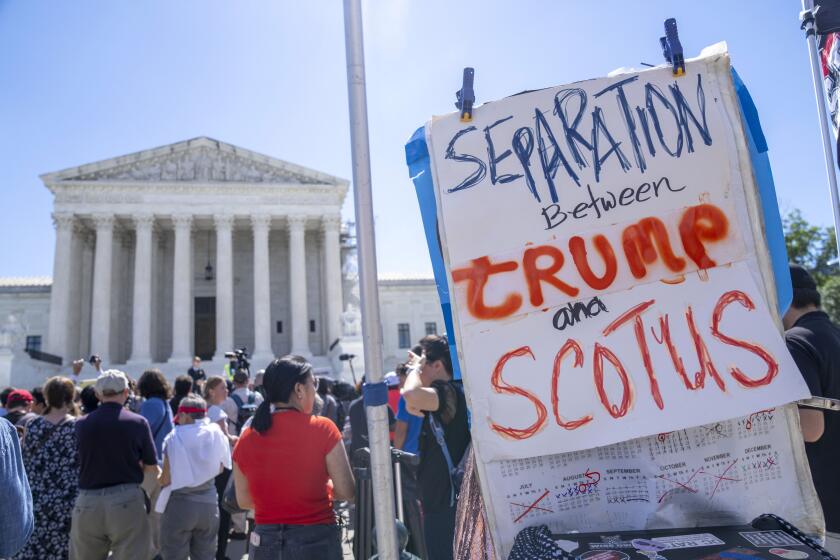Column: Does freedom itself depend on the outcome of this election? Donald Trump’s probably does

Donald Trump is at a pivotal point in his personal history. For him, the upshot of the election will be either a series of criminal prosecutions likely to result in incarceration or a few legal nuisances that he can largely or completely dismiss.
A victory for Kamala Harris next week would leave Trump with no new cards to play against the juggernaut of criminal cases already pending against him. We could expect turnover at the highest ranks of the Department of Justice, up to and including Atty. Gen. Merrick Garland. But the new leadership would be nearly certain to retain special counsel Jack Smith, who has earned high marks for his aggressive pursuit of Trump’s alleged federal crimes.
That would allow Smith to continue to pursue the two prosecutions he has brought against the former president: one for his role in trying to overturn the 2020 election, culminating with the Jan. 6, 2021, assault on the Capitol; the other for purloining government documents and obstructing the authorities’ efforts to recover them from his Florida estate, Mar-a-Lago.
The conservative justices granted presidents broad protection for official acts. That appears to include much of the conduct in the federal Jan. 6 indictment.
As a matter of sheer legal merit, the latter is the strongest of all the criminal cases against Trump. The evidence is overwhelming that Trump absconded with documents he had no right to possess as an ex-president and then engaged in a nearly two-year stonewalling of the federal government’s entirely legitimate efforts to get them back. His alleged obstruction included lying about the extent of his compliance with a federal subpoena and ordering his co-conspirators to hide documents that he knew the government wanted. And for all we know, his sloppy, selfish handling of sensitive information about national security may have put U.S. assets at grave risk.
What makes the case especially powerful is that anyone who engaged in similar conduct would undoubtedly face serious charges; indeed, the Justice Department routinely prosecutes people for mishandling a small fraction of the material Trump misappropriated. So no one can legitimately argue that he was singled out for political purposes or that the case pushes the legal envelope in any way.
Trump has nevertheless managed to elude justice in the case because of a series of partisan rulings by U.S. District Judge Aileen Cannon, who ultimately went so far as to order the case dismissed on the ground that Smith’s appointment lacked proper congressional authority. That ruling is now before the 11th Circuit U.S. Court of Appeals, which is likely to reverse it and could order Cannon’s recusal. And while a determined district court judge can find many ways to make charges disappear, Cannon would face even more scrutiny and have less recourse if her patron loses his bid to return to the White House.
The case, in short, should proceed to a conviction. And the likely sentence under federal guidelines (which the courts may depart from) looks to be almost 20 years.
The billionaire and Donald Trump backer gave away millions to induce registrations in swing states. But violations of election law are often hard to address.
If the documents case is the most open and shut against Trump, the Jan. 6 case is the most important in that it goes to the core of his iniquity as president. But Trump got another big lucky break here, not from the district court — Tanya Chutkan is a no-nonsense federal judge who has moved the case briskly — but from the U.S. Supreme Court. The conservative justices threw a monkey wrench into the case with their opinion granting broad presidential immunity from prosecution, working through the implications of which will take at least another year.
Still, when the dust settles, the evidence is more than strong enough to lead to conviction on the core charges that are likely to remain. And judging by the sentences imposed on the most culpable of the Jan. 6 ground soldiers, Trump would be looking at years in prison in this case too.
That leaves the two state cases against the former president. In New York, Trump is to be sentenced in less than a month for his conviction on 34 felony counts of falsifying business records to cover up hush money payments to the adult film actor Stormy Daniels. And in Georgia, a racketeering case stemming from the Jan. 6 plot is in a sort of deep freeze as the state courts try to sort out whether Fulton County Dist. Atty. Fani Willis and her office need to be recused for ethical reasons.
The future of the Georgia case is uncertain in any scenario. But if Trump loses the election, he will face sentencing in Manhattan. He is likely to serve little if any time in custody as a result, but he can probably count on a long term of probation, which itself entails a significant deprivation of liberty.
Finally, the possibility remains that Trump will surface as a defendant in other state cases involving conspiracies to overturn the election by appointing false electors. His involvement in those schemes is a matter of record.
Add all that together, and the bottom line is that Trump will be forced to endure one criminal trial after another and the possibility of prison sentences interrupted only for proceedings in other cases.
But what if Trump emerges as the victor next week? The difference for him alone would be astonishing. Regaining the White House would amount to a free pass for a presidency and post-presidency that have been nothing short of a crime spree.
First and foremost, as head of the executive branch, Trump could and would simply order the Department of Justice to drop the two ongoing federal cases. Indeed, Trump announced last week that he would fire the special counsel “within two seconds” of taking office and pointed to the Supreme Court’s immunity decision as ensuring his power to do so. That would bring all of Smith’s work to a grinding and permanent halt.
As for New York, even as president, Trump would have no official authority to order Manhattan Dist. Atty. Alvin Bragg to stand down. But he would probably argue in federal court that a state can’t pursue a criminal case against — much less incarcerate — a sitting president. And it’s likely that the Supreme Court would and should find such a principle implicit in the Constitution: The federal government could hardly function if the states had that power.
In that case, any sentence in New York, including a probationary one, would be served only after Trump is out of office, at which point this may be a very different country. For starters, Trump has signaled his intent to bring federal charges against Bragg.
Finally, a Trump presidency probably forecloses any possibility of his being included in any additional state prosecutions. Indeed, it might spell the end of those prosecutions altogether.
Trump’s entire campaign to regain the presidency can be seen as an outlandish gamble on evading accountability for a series of grave and manifest crimes. Should he win, he will take it as a popular verdict that he is above the law, notwithstanding anything in the Constitution. And as a practical matter, he will be right.
Harry Litman is the host of the “Talking Feds” podcast and the “Talking San Diego” speaker series. @harrylitman
More to Read
A cure for the common opinion
Get thought-provoking perspectives with our weekly newsletter.
You may occasionally receive promotional content from the Los Angeles Times.













